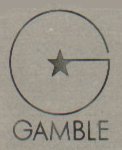Kenny Gamble and Leon Huff soon decided to join forces to become one of the most successful songwriting and producing teams of the '70s, beginning with R&B and pop hits by the Intruders. The Intruders' first hit was "We'll Be United" [Gamble 201] in 1966, followed by "Together", "Cowboys To Girls" and "Love Is Like A Baseball Game", among others. Gamble and Huff also broke into the pop charts in 1967 with the Soul Survivors' "Expressway To Your Heart", a white-soul band formed by the Ingui brothers (Charles and Richard) on the small Philadelphia-based Crimson label [Crimson 1010]. They also wrote and produced late '60s/early '70s Atlantic hits for Archie Bell & the Drells ("I Can't Stop Dancing") and Wilson Pickett (the In Philadelphia album including "Don't Let The Green Grass Fool You" and "Engine #9"). But most of all, they were instrumental in reviving the career of ex-Vee-Jay singer Jerry Butler, who found a new fame in 1967 with hits like "Only The Strong Survive", "Moody Woman", "What's The Use Of Breaking Up" and "Hey Western Union Man" on Mercury. Some of these were written in collaboration either with Thom Bell or Jerry Butler himself.
These Jerry Butler records really set the scene for what was to come, i.e. the birth of the Philadelphia sound and the Philadelphia International record label: silk voices singing in high register, a tight rhythm section (the MFSB session musicians) and lush string arrangements. All these ingredients helped to define the soon-to-burst mid-'70s disco style. Eventually Jerry Butler joined the Philadelphia International label for two albums in the late 1970s.
Before the Philadelphia International label was founded in 1971, Gamble and Huff had already tried their hands setting up record labels. The Excel and Gamble labels were started in 1967 (but only the latter released albums), with such artists as the Intruders (four albums between 1967 and 1969), Billy Paul (the classic Feelin' Good At The Cadillac Club later re-released on Philadelphia International) and the first album by the Jaggerz, a Pittsburgh rock band led by guitarist-singer-songwriter Dominic Ierace (aka Donnie Iris). Although the 1969 album by the Jaggerz was not paricularly successful, the group shifted to the Kama Sutra label and hit the charts in 1970 with "The Rapper." In 1970 the original Gamble label was put on hold, to be resurrected in 1973 as a Philadelphia International subsidiary.
In 1969, the Neptune label was founded. It was distributed through Chess, and although it released only 4 albums, it marked the starting point of an extremely successful collaboration with what would become one of the best artists in the Philadelphia International stable, the O'Jays.
The O'Jays weren't newcomers, as they had released singles as early as 1963 (their first single was "How Does It Feel" on Imperial 5942). They also had R&B and Pop hits with "Lipstick Traces On A Cigarette" [Imperial 66102 in 1965] and "I'll Be Sweeter Tomorrow" [Bell 691 in 1967]. They were recommended to Gamble and Huff by the Intruders, and after a slow start on Neptune, with small hits like "One Night Affair" and "Looky Looky", they hit big in the summer of 1972 on the Philadelphia International label with the quintessential Philadelphia song "Back Stabbers".
Just as Motown and Stax in the '60s were closely associated with a specific sound for a specific city (i.e., Detroit and Memphis, respectively), within a few years -- and with the help of gifted session musicians and arrangers -- Kenny Gamble and Leon Huff had created "The Sound Of Philadelphia," aka TSOP.
In the beginning, most of the artists in the Philadelphia International roster were coming from the closed Gamble and Neptune labels, but it soon expanded. 1972 was a very good year as the newly founded label struck gold with Harold Melvin & the Blue Notes' "I Miss You" and "If You Don't Know Me By Now," and Billy Paul's wonderful "Me And Mrs. Jones". Billy Paul had already released two albums on the Gamble and Neptune labels, but Harold Melvin and the Blue Notes were a real "discovery," having previously released only two singles on Landa (as the Blue Notes) in 1964 and Arctic in 1967. Their lead singer was Theodore Pendergrass, who began a successful solo career in 1977 on the same label before switching to Elektra.
Until the mid-'70s, these three artists, along with the occasional albums by the likes of the Intruders and the Three Degrees, provided most of the label output. The Three Degrees had already released singles on Swan, Metromedia, Roulette and Neptune in the '60s and early '70s, as well as a Richard-Barrett- produced album on Roulette, Maybe.
Most of the tracks were recorded at the Sigma Sound Studios in Philadelphia, with the help of the same session musicians. These included Earl Young (drums), Ronnie Baker (bass), Roland Chambers, Norman Harris and Bobby Eli (guitars), Larry Washington (percussion), Vincent Montana Jr. (vibes), Leon Huff, Ron Kersey and Leonard Pakula (keyboards) and Don Renaldo's strings and horns. These recording sessions were mostly produced by Gamble and Huff, but sometimes production was by in-house arrangers Bobby Martin and John "Kack Faith", songwriter's-arrangers Dexter Wansel and Walter "Bunny" Sigler, or session musicians (and sometimes composers) Norman Harris and Lenny Pakula. This core of musicians also released albums under the co-operative name of MFSB (Mother Father Sister Brother) and hit big in 1974 with the instrumental "TSOP", which included backing vocals by the Three Degrees.
Kenny Gamble and Leon Huff, along with their musicians and arrangers, did not write and produce solely for the Philadelphia International label, but also for others artists : the Spinners and Blue Magic on Atlantic, First Choice and the Delfonics on Philly Groove, the Persuaders on Atco, Eddie Kendricks on Tamla, the Temptations on Atlantic, the Love Committee on Gold Mind, and others. They also strongly influenced David Bowie for his "Young Americans" album.
The Gamble label was revived in 1973 and two subsidiaries were formed : TSOP in 1974 and Golden Fleece in 1975.
In 1975 a payola scandal hit the label, with the accusation of exchanging money for airplay. Although the label protested, eventually Kenny Gamble was fined and the charges against Leon Huff were dropped.
Even if the late '70s were not as good to the Philadelphia sound as the previous years, it was still a golden era, with hits by the O'Jays and some newcomers to the label : Lou Rawls, who revived his career with some great albums and the wonderful "You'll Never Find Another Love Like Mine", Teddy Pendergrass' solo career, the Trammps (whose disco stomp was led by group member Earl Palmer's drums), the Jacksons (an association with Epic for two great albums after they departed from Motown), composers- turned-artists Gene McFadden and John Whitehead's "Ain't No Stoppin' Us Now", People's Choice, the Jones Girls (Brenda, Shirley and Valerie) and some '60s and early '70s refugees such as Dee Dee Sharp (Mrs. Gamble), Don Covay, Archie Bell & the Drells and the Stylistics.
By 1985, despite the signing of Patti Labelle, the hits were at a low ebb and Philadelphia International switched its distribution to Manhattan (a Capitol subsidiary). They switched again to BMG in 1991, but without much success.
 On to the Gamble Records Album Discography
On to the Gamble Records Album Discography  On to the Philadelphia International Album Discography
On to the Philadelphia International Album Discography  On to the TSOP Album Discography
On to the TSOP Album Discography  On to the Golden Fleece Album Discography
On to the Golden Fleece Album Discography
 Back to the Discography Listings Page
Back to the Discography Listings Page  Back to the Both Sides Now Home Page
Back to the Both Sides Now Home Page